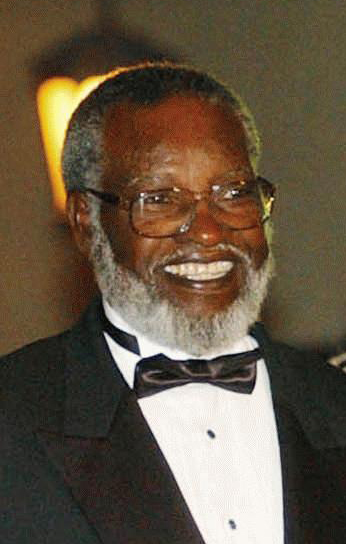|
Anti-Corruption Commission Of Namibia
The Anti-Corruption Commission of Namibia (ACC) is an agency of the executive branch of the Government of Namibia. It was established under section 2 of the Anti-Corruption Act 8 of 2003 and inaugurated on 1 February 2006 by president Hifikepunye Pohamba. The aim of the commission is to fight against corruption. Corruption is high in Namibia, i.e. unofficial but necessary bribe for receiving work permit in Namibia Investment Centre (as they are responsible for such decisions) is about N$10000. The Anti-Corruption Act is Namibia's primary anti-corruption law, covering passive bribery, active bribery, attempted corruption, extortion and bribing a foreign public official. Management The current management consists of the Director-General Paulus K. Noa, Deputy Director-General Erna Van Der Merwe and Executive Director Tylvas N. Shilongo. References {{Reflist External links ACC Official WebsiteCorruption Profile Namibiafrom the Business-Anti-Corruption Portal The Risk & Compliance ... [...More Info...] [...Related Items...] OR: [Wikipedia] [Google] [Baidu] |
Executive (government)
The Executive, also referred as the Executive branch or Executive power, is the term commonly used to describe that part of government which enforces the law, and has overall responsibility for the governance of a state. In political systems based on the separation of powers, such as the USA, government authority is distributed between several branches in order to prevent power being concentrated in the hands of a single person or group. To achieve this, each branch is subject to checks by the other two; in general, the role of the Legislature is to pass laws, which are then enforced by the Executive, and interpreted by the Judiciary. The Executive can be also be the source of certain types of law, such as a decree or executive order. In those that use fusion of powers, typically Parliamentary systems, the Executive forms the government and its members generally belong to the political party that controls the legislature or "Parliament". Since the Executive requires the sup ... [...More Info...] [...Related Items...] OR: [Wikipedia] [Google] [Baidu] |
Government Of Namibia
The government of Namibia consists of the executive, the legislative and the judiciary branches. The Cabinet is the executive organ of government, implementing the laws of the country. It consists of the president, the prime minister and his deputy, as well as the ministers. The legislative organs of government are the National Council and the National Assembly. They make the laws of the country. The judiciary organs of government are the courts. The highest court of Namibia is the Supreme Court. There are also the high courts and lower courts. The Namibian government is partly centralised and partly regional. In the executive branch, central government consists of ministries, offices and agencies, whereas regional government consists of regional councils, and constituencies within these. The legislation is centralised in the lower house (National Assembly), and regional in the upper house (National Council). The judiciary is centralised in the Supreme Court, whereas high court ... [...More Info...] [...Related Items...] OR: [Wikipedia] [Google] [Baidu] |
President Of Namibia
The president of the Republic of Namibia is the head of state and the head of government of Namibia. The president directs the executive branch of the Government of Namibia, as chair of the Cabinet and is the commander-in-chief of the armed forces, according to the Constitution of Namibia. Key ;''Political parties'' * List of officeholders Timeline Latest election See also *Namibia **Politics of Namibia **List of colonial governors of South West Africa **Vice-President of Namibia **Prime Minister of Namibia **Cabinet of Namibia *Lists of office-holders References External linksWorld Statesmen – Namibia {{Heads of state and government of Africa Government of Namibia Namibia Namibia (, ), officially the Republic of Namibia, is a country in Southern Africa. Its western border is the Atlantic Ocean. It shares land borders with Zambia and Angola to the north, Botswana to the east and South Africa to the south and e ... Presidents ... [...More Info...] [...Related Items...] OR: [Wikipedia] [Google] [Baidu] |
Hifikepunye Pohamba
Hifikepunye Lucas Pohamba (born 18 August 1936) is a Namibian politician who served as the second president of Namibia from 21 March 2005 to 21 March 2015. He won the 2004 presidential election overwhelmingly as the candidate of SWAPO, and was reelected in 2009. Pohamba was the president of SWAPO from 2007 until his retirement in 2015. He is a recipient of the Ibrahim Prize. Prior to his presidency, Pohamba served in various ministerial positions, beginning at Namibia's independence in 1990. He was Minister of Home Affairs from 1990 to 1995, Minister of Fisheries and Marine Resources from 1995 to 1997, Minister without portfolio from 1997 to 2000, and Minister of Lands, Resettlement and Rehabilitation from 2000 to 2005. He was also secretary-general of SWAPO from 1997 to 2002 and vice-president of SWAPO from 2002 to 2007. Early life Hifikepunye Pohamba was born on 18 August 1936 in Okanghudi, South West Africa, in an area then known as Ovamboland (today in the Ohangwen ... [...More Info...] [...Related Items...] OR: [Wikipedia] [Google] [Baidu] |
Business-Anti-Corruption Portal
The Risk & Compliance Portal (formerly The Business Anti-Corruption Portal) is a powerhouse for business anti-corruption information offering tools on how to alleviate or reduce risks and costs of corruption when doing business abroad. All the information on the Portal is produced by GAN Integrity Solutions, a Denmark-based IT & Professional Services firm. The Portal was created in 2006 and is aided by the European Commission and a number of European governments. The BACP is referred to by many government and non-government organisations and co-operations, amongst others, the Organisation for Economic Co-operation and Development, the United Nations, the OECD Business and Industry Advisory Committee (BIAC), and the World Bank. In addition, the BACP is the only externally cited tool for anti-corruption risk assessment in the UK Bribery Act 2010 Quick Start Guide. The BACP is listed in the UN Global Compact Anti-Corruption Tools Inventory as an efficient resource to help compan ... [...More Info...] [...Related Items...] OR: [Wikipedia] [Google] [Baidu] |

